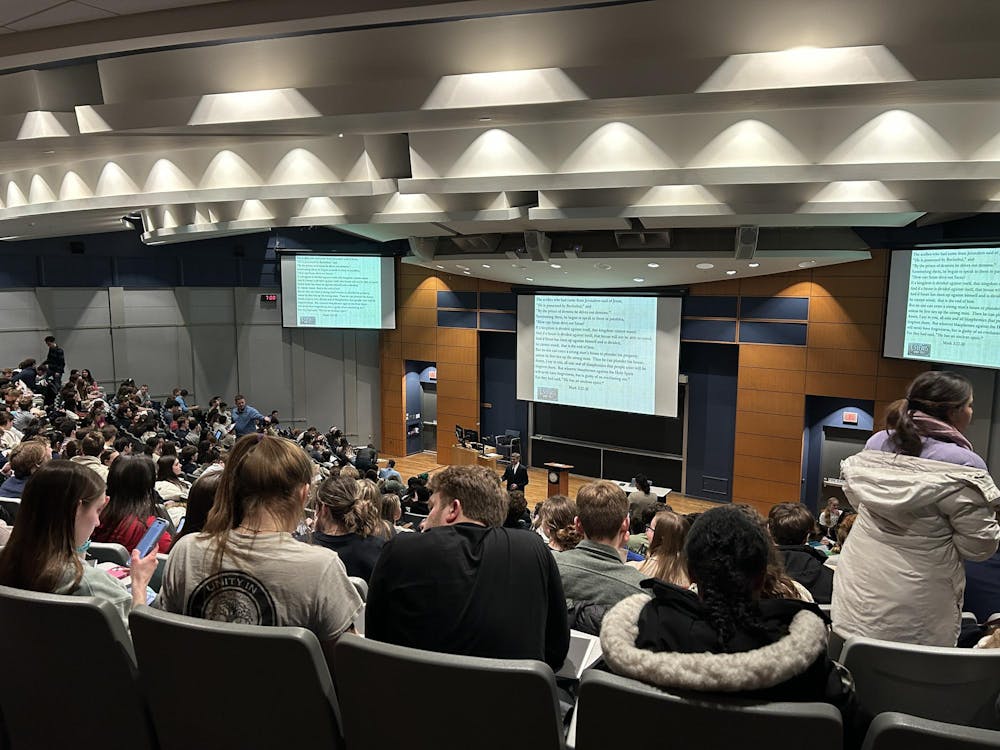Each Monday at 7 p.m., over 450 students pack into a sometimes uncomfortably warm and humid Room 101 in DeBartolo Hall to listen to professor William Mattison lecture on the British writer and Anglican theologian C.S. Lewis.
Even the largest lecture hall on campus does not have sufficient capacity to seat the number of students interested in Mattison’s 1-credit theology course “C.S. Lewis on God Evil, Virtue & Vice.”
It’s a crowd like Mattison has never taught before. “This is a whole new ballgame for me,” he said.
Julia Wilson, a junior taking the class, showed up well in advance of the class starting.
“I made sure to get here early to sit with my friends near the front,” she said.
The class is a follow-up of sorts to Fr. Kevin Grove’s 1-credit class on St. Augustine’s “Confessions.” That course, offered last spring, attracted a similarly large number of students.
Ryan McEllen, a sophomore who took Grove’s course, said he signed up for Mattison’s class because of how much he enjoyed the “Confessions” class last year.
“This is one of my favorite classes I feel like I've taken at Notre Dame so far. C.S. Lewis is one of my favorite writers, and the lesson was so inspirational and really like made me think about my faith more,” he said.
After seeing the demand for the “Confessions” class, Grove asked Mattison if he would be willing to teach a 1-credit class. He agreed, suggesting C.S. Lewis as the focus of the course.
“He’s one of the great Christian apologists,” Mattison explained.
However, the class is not an oral biography of the man.
“The goal of the course is not for students to walk out of there like pros on C.S. Lewis as a person or his thought,” Mattison clarified.
Instead, Mattison described the class as using the “accessible and illuminating work” of Lewis to prompt students to reflect on theology and its practical implications on life.
“The main theme of the course is that theology is inherently practical, and what we believe on big-picture questions about who God is and where good and evil come from and who Christ is have ramifications for how each one of us, individually and communally, live our lives,” Mattison said.
The course focuses on two of Lewis’s works, “The Screwtape Letters” and “The Great Divorce,” among other selected readings.
“The beautiful thing about ‘The Great Divorce’ and ‘The Screwtape Letters’ is both books in very creative, allegorical ways, address how the kind of cosmic level battle of salvation history plays out in each one of our lives, how we have the opportunity to kind of choose good and avoid evil,” Mattison said.
In each class session, Mattison plays an audio recording of one of “The Screwtape Letters,” a satirical and didactic series of messages written from the perspective of a mentor demon to his mentee. Students then discuss the excerpt with peers next to them.
The capstone project for students taking the class will be to write their own “Screwtape Letter” set in a university context.
“They’re supposed to write from the perspective of the demons, how to tempt someone to do something badly, and in doing so, show that they have an insightful awareness of how human persons operate and how they can do so in a manner that's reflective of God's way or not God's way,” Mattison explained.
Mattison’s eventual goal is to compile 30 to 40 standout submissions into a book.
McEllen said he is eager to write his own.
“I’m really excited for the assignment for this class of creating your own Screwtape Letter,” he said. “I feel like that's really interesting and creative, and will allow me to interpret C.S. Lewis's work in a different frame.”
Mattison expressed his gratitude for the opportunity to teach the class.
“It's a beautiful sign of what our students are longing for, and just how good that they are, that they want to do something like this,” he said.










